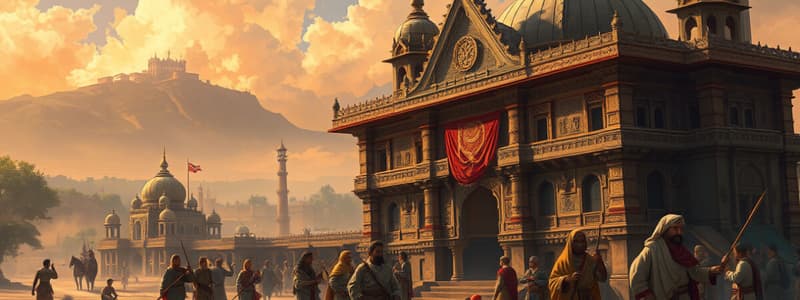Podcast
Questions and Answers
What did the British establish the East India Company to acquire?
What did the British establish the East India Company to acquire?
- Spices and other goods found in Asia
- Workers for their factories and mills
- Soldiers for their armies and navies
- Both A and B (correct)
What was the role of viceroys appointed by the British government in India beginning in the 1800s?
What was the role of viceroys appointed by the British government in India beginning in the 1800s?
Represent the interests of the crown
What does the shaded area on the map show?
What does the shaded area on the map show?
The Mughal Empire in the 1700s
Who ran the regional governments set up by the East India Company in India?
Who ran the regional governments set up by the East India Company in India?
What caused most ordinary Indian citizens to suffer during British rule?
What caused most ordinary Indian citizens to suffer during British rule?
Why was the Indian National Congress founded in 1885?
Why was the Indian National Congress founded in 1885?
In what year did the British raj's rule end in India?
In what year did the British raj's rule end in India?
What was the All-India Muslim League in the late 1800s?
What was the All-India Muslim League in the late 1800s?
What were Indian soldiers who served in the East India Company's private army called?
What were Indian soldiers who served in the East India Company's private army called?
What was one positive result of the British raj's rule in India?
What was one positive result of the British raj's rule in India?
How did British imperialism affect the people of India?
How did British imperialism affect the people of India?
What were the main goals of the East India Company when it was created in 1600?
What were the main goals of the East India Company when it was created in 1600?
What happened to the power of the Mughal Empire as the East India Company's influence grew?
What happened to the power of the Mughal Empire as the East India Company's influence grew?
How did the East India Company act by the 1750s?
How did the East India Company act by the 1750s?
What was one major economic impact of the East India Company's rule in India?
What was one major economic impact of the East India Company's rule in India?
What did Robert Clive believe about Indian troops in his letter to the prime minister?
What did Robert Clive believe about Indian troops in his letter to the prime minister?
What was the role of sepoys in the East India Company's expansion?
What was the role of sepoys in the East India Company's expansion?
Study Notes
British Colonial Expansion
- The East India Company was established for trade, focusing on spices and goods in Asia, and expanding military resources and factory workers in India.
- The British government appointed viceroys to represent the Crown's interests in India beginning in the 1800s.
Historical Context
- The Mughal Empire was the dominant power in India during the establishment of the East India Company in the 1600s, uniting both Hindus and Muslims.
- The Mughal Empire's decline in the 1700s facilitated the East India Company's growth and establishment of regional governance in India.
Socio-Economic Impact
- Ordinary Indian citizens suffered from famines during British rule.
- India developed one of the world’s largest railway networks by 1900 as a positive effect of British raj.
Political Developments
- The Indian National Congress was founded in 1885 to advocate for equal rights for Indians.
- The All-India Muslim League emerged in the late 1800s as a significant political entity.
Military Aspects
- Indian soldiers in the East India Company's army were known as sepoys, who were better compensated than by local powers.
- The British used a small, well-paid sepoy army to expand and enforce their rule, while also fostering an environment of discontent among Indians.
Economic Exploitation
- The East India Company transitioned from a trading entity to a governing body by the 1750s, substantially altering India's economy.
- India was a source of raw materials like cotton, which were sent to Britain for manufacturing, while local Indian industries were suppressed.
Cultural Repercussions
- Resistance against British rule grew as traditions faced challenges and many Indians experienced loss of land and wealth.
- The Rifle Cartridge Crisis highlighted tensions between Hindu and Muslim communities, stemming from cultural insensitivity under British rule.
Conclusion of Control
- The British raj officially ended in India in 1947, marking a significant historical change.
Studying That Suits You
Use AI to generate personalized quizzes and flashcards to suit your learning preferences.
Description
Explore the significant events and impacts of British colonial expansion in India, focusing on the establishment of the East India Company and the socio-political developments that followed. This quiz covers the historical context of the Mughal Empire, the changes brought about during British rule, and the rise of political movements advocating for Indian rights.




